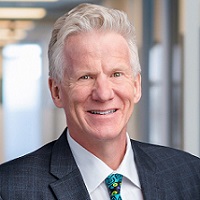 By Nick van Terheyden aka Dr Nick, Principal, ECG Management Consulting
By Nick van Terheyden aka Dr Nick, Principal, ECG Management Consulting
Twitter: @drnic1
Host of Healthcare Upside Down – #HCupsidedown
When I was a young doctor, I always volunteered to talk to the patient’s relatives and have the difficult discussions with them. It wasn’t fun, but I recognized the importance of it and the significance for the family.
At the time, I thought I did a good job of communicating bad news—which, to be clear, often meant the death of a close relative. I believed I was compassionate, supportive, and adept at handling the family’s emotions and understanding what they were going through.
Episode NOW on Demand
Nothing could be further from the truth, as I discovered when my own father died some years later. It was only going through that experience that made me realize how difficult it is to truly comprehend someone’s feelings unless you’ve had your own similar experience.
Over the last several years, I’ve heard a recurring theme of including patients’ voices and incorporating their opinions and perspectives into healthcare services. Despite all the talk, I haven’t seen much execution of this.
April is Testicular Cancer Awareness Month. Testicular cancer is the most common cancer in young men aged 20–35 years. The good news is that it’s highly treatable and has very good outcomes—if discovered and treated promptly.
Steve McMillen is a principal with ECG Management Consultants, and he’s spent 10 years focusing on improving patient access. In the course of carrying out his regular personal screening, Steve discovered a lump in his testicle that led him on a cancer care journey—thankfully to a positive outcome, but not without some challenges that, with the patient’s voice, could be smoothed out or avoided completely. He shares his experience on this episode. Here are a few excerpts.
Diagnosis.
“In 2021, I was diagnosed with testicular cancer. I found a lump, went to the doctor, went to a specialist and oncologist, and had surgery all within five days. The surgery got rid of the cancer for the time being, and I was able to go back to work the next day. So it was almost as though nothing happened. Three months later, the cancer had spread into my lymph nodes. I was in chemo two weeks later. I went on a three month journey—not being able to work, four rounds of chemo, losing my hair, and being in the hospital for a week with an infection. The good news is we’re about a year and a half [out from] that, and I’m cancer free and on the surveillance plan.”
Little things that add up.
“As a patient access consultant, I really appreciated the referral turnaround time and how quickly I was able to go through the system. But there are also things that I’d never considered—most of which didn’t have to do with the X’s and O’s of how to answer a call or schedule an appointment, but more of how to make sure the patient is feeling the right way and has the right interactions with their care team.”
“So one trivial but profound example for me is that every time I called my cancer center, there would always be the same hold music—it never changed. I’ve been consulting with contact centers for 10 years, and I’ve never even once considered hold music. But when you’re in pain, you’re nauseous, and you’re on your way to the hospital, and you hear that same music, it starts to trigger a sensory emotion. After the cancer was gone, even six months later, I’d call for my surveillance check and I’d hear that music. And it just triggered this nausea in me. It’s those little things that we don’t think of in big-picture consulting, but it makes or breaks someone’s day as a patient.”
Bringing his patient experience to his consulting practice.
“Something our team started focusing on in the last few years is including the patient experience. We make sure the health system is having patient focus groups, because the patient’s voice is just so important. When it comes to the actual feel, and the actual experience, we need to hear what our patients have to say. And I’m excited that more and more health systems are starting to do that.”
This article was originally published on the ECG Management Consulting blog and is republished here with permission.
About the Show
The US spends more on healthcare per capita than any other country on the planet. So why don’t we have superior outcomes? Why haven’t the principles of capitalism prevailed? And why do American consumers have so much trouble accessing and paying for healthcare? Dive into these and other issues on Healthcare Upside/Down with ECG principal Dr. Nick van Terheyden and guest panelists as they discuss the upsides and downsides of healthcare in the US, and how to make the system work for everyone.
Tune in weekdays at 9am, 5pm, and 1am ET.
Join the conversation on Twitter at #HCupsidedown.
